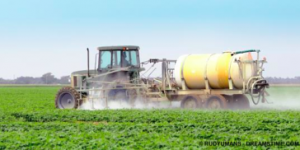Pesticides, Herbicides, Hormones & Antibiotics
Although you won’t find these listed on an ingredients label, the use of pesticides, herbicides, hormones, and antibiotics in agricultural production is widespread in this country. And it’s having serious consequences we’re only just beginning to understand. Some of these consequences extend far beyond the mere individuals who are consuming the foods produced with these toxic substances; consequences that are upsetting the natural balance of our precious ecosystems and will affect generations to come.
 Many pesticides, herbicides, hormones, antibiotics and other synthetic drugs, send hormone-disrupting chemicals into our bodies and the environment. There’s growing evidence that these hormone disrupters may be contributing to worldwide increases in health problems, including precocious puberty, breast and prostate cancer, infertility, low sperm counts, auto-immune diseases, and even osteoporosis.
Many pesticides, herbicides, hormones, antibiotics and other synthetic drugs, send hormone-disrupting chemicals into our bodies and the environment. There’s growing evidence that these hormone disrupters may be contributing to worldwide increases in health problems, including precocious puberty, breast and prostate cancer, infertility, low sperm counts, auto-immune diseases, and even osteoporosis.
These toxic chemicals are also linked to a host of lesser conditions such as allergies, food intolerances, candida, learning disabilities, PMS, menopausal issues, and more. In addition, the food industry’s excessive use of antibiotics is contributing greatly to the problem of antibiotic-resistant bacteria and viruses. Toxic pesticides are similarly creating pesticide-resistant bugs.
Less than 100 years ago it took 4-5 years to bring cattle to slaughter. And now, with the help of enormous amounts of corn, protein supplements, and drugs, including growth hormones and antibiotics, it only takes 14 months. When you consider what these substances are doing to the animals who are subjected to them, it’s not difficult to imagine the impact they could also be having on our human bodies and our environment.
Whether it’s animal products or produce, the best way to avoid toxic pesticides, herbicides, hormones, and antibiotics is to eat certified organic foods and those that clearly state on their labels that they do not use or contain these harmful substances.
Helpful Resource: Our Stolen Future: Are We Threatening Our Fertility, Intelligence, and Survival? By Theo Colburn, is a classic well-documented book with an eye-opening overview of this topic.
Genetically Modified Organisms (GMO’s)
You won’t find these listed on food product labels either, despite the fact that over 90% of Americans say the FDA should require labeling of genetically modified organisms (GMO’s), also known as genetically engineered (GE). Not surprisingly, strong lobbying on the part of the food industry has halted such a requirement. This is most unfortunate because GMO’s are one of history’s most dangerous and radical changes in our diet. Introduced into our food supply in the mid-1990s, these largely unregulated ingredients are now in 70% or more of processed foods in the US.
The American Academy of Environmental Medicine reported that “Several animal studies indicate serious health risks associated with GM food,” including infertility, immune problems, accelerated aging, faulty insulin regulation, and changes in major organs and the gastrointestinal system. With the biggest problem we’re seeing being a dramatic increase in unpredictable and hard-to-detect food allergies.
In terms of environmental concerns, farmers are finding that the pesticides the bio-tech companies sell to go with the GM crops aren’t working. As a result, farmers are resorting to older, extremely toxic chemicals. Even more insidious, genetically engineered organisms cross-pollinate with other non-GMO crops and the subsequent transmutation is irreversible. This is alarming when you consider that the long-term consequences for both humans and the environment are, as yet, not fully known. What is eminently clear, however, is that there are problems—potentially catastrophic problems—associated with these Frankenfoods, as opponents often call them, and further testing and regulation are needed. The damage that may be done is irreversible and has the potential to affect every living creature on the planet.
In addition to the health hazards, the biotech industry is undermining the livelihoods of farmers the world over, forcing them to purchase their patented seeds year after year, and suing them for exorbitant amounts if they don’t. The practice of planting saved seed is a necessity for many farmers, especially in underdeveloped nations who can’t afford to purchase new seed every year.
Keep your family and the environment safe, once again, by consuming foods that are organic and clearly state that they use non-GMO ingredients. Also, be sure to get involved with organizations pushing for mandatory labeling and stricter regulations
Helpful Resource: Visit www.responsibletechnology.org for online shopping guides, how to get involved, and educational materials including, the shocking documentary, Genetic Roulette and book, Seeds of Deception, both by Jeffrey M. Smith, a leading expert on GMO’s.
